 Petzlover
Petzlover Dandie Dinmont Terrier is originated from United Kingdom but Kooikerhondje is originated from Netherlands. Dandie Dinmont Terrier may grow 12 cm / 4 inches shorter than Kooikerhondje. Both Dandie Dinmont Terrier and Kooikerhondje are of same weight. Both Dandie Dinmont Terrier and Kooikerhondje has almost same life span. Both Dandie Dinmont Terrier and Kooikerhondje has almost same litter size. Dandie Dinmont Terrier requires Moderate Maintenance. But Kooikerhondje requires Low Maintenance
Dandie Dinmont Terrier is originated from United Kingdom but Kooikerhondje is originated from Netherlands. Dandie Dinmont Terrier may grow 12 cm / 4 inches shorter than Kooikerhondje. Both Dandie Dinmont Terrier and Kooikerhondje are of same weight. Both Dandie Dinmont Terrier and Kooikerhondje has almost same life span. Both Dandie Dinmont Terrier and Kooikerhondje has almost same litter size. Dandie Dinmont Terrier requires Moderate Maintenance. But Kooikerhondje requires Low Maintenance
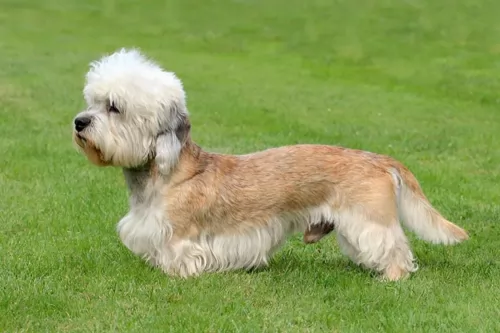 The rough coated Dandie Dinmont Terrier originates from Scotland. They were used centuries ago for hunting otters and badgers.
The rough coated Dandie Dinmont Terrier originates from Scotland. They were used centuries ago for hunting otters and badgers.
There are theories that exist that the dog is a cross between Scottish- and Skye Terriers while others believe there must be some Dachshund in the mix because of the long body of the Dandie Dinmont Terrier.
The Dandie Dinmont Terrier was first recorded as a distinct breed in the late 1600s. The British Dandie Dinmont Terrier Club was formed in 1875 while the American Kennel Club recognized the Dandie in 1886.
 The Kooikerhondje is of Dutch ancestry and is a medium-sized spaniel-type dog breed that has always been a working dog, being used to attract ducks into traps but being bred as an all-purpose dog.
The Kooikerhondje is of Dutch ancestry and is a medium-sized spaniel-type dog breed that has always been a working dog, being used to attract ducks into traps but being bred as an all-purpose dog.
They were particularly sought after in the 17th and 18th century, appearing in paintings of Rembrandt. The breed died out during World War II, but it was rescued by Baroness van Hardenbroek van Ammerstol and recognized by the Dutch Kennel Club.
In January 2018 the Nederlnadse Kooikerhondje is fully recognized by the American Kennel Club, competing in the Sporting Group.
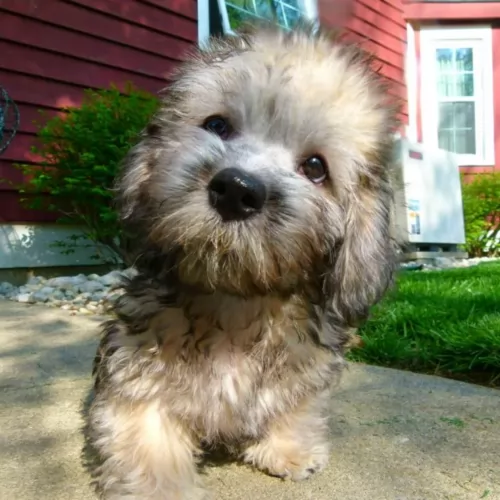 The Dandie Dinmont Terrier is a small dog who stands between 20 – 28cm at the withers and weighs between 8 and 11kg. He is recognizable by his fluffy head of hair.
The Dandie Dinmont Terrier is a small dog who stands between 20 – 28cm at the withers and weighs between 8 and 11kg. He is recognizable by his fluffy head of hair.
He actually has quite a unique look with his long body and slightly over-sized head. He has floppy ears and a long tail. His coat is quite unusual too in that it can be silky and long around the face, legs and belly, while the topcoat is fairly shortish and crisp. His coat color is fawn to brown or reddish. He isn’t a heavy shedder.
Known also as the Dandie, Charlie’s Hope Terrier, the Mustard and Pepper Terrier, the Dandie Dinmont makes an excellent family pet with his calm demeanor, being somewhat reserved around strangers.
He is an alert, intelligent little dog and will warn you of strangers coming into your space. He therefore makes a good watchdog. He is loving and loyal to his human family and will readily fit into life in the city or in the countryside.
They are good with children and pets but with his independent streak, he will require training and socialization if you want him to behave and be obedient.
 The Kooikerhondje is a medium sized dog standing at 35 – 40cm at the withers and weighing anything between 9 – 11kg. He has a medium length coat which is a red and white color, with floppy ears.
The Kooikerhondje is a medium sized dog standing at 35 – 40cm at the withers and weighing anything between 9 – 11kg. He has a medium length coat which is a red and white color, with floppy ears.
A distinctive feature with this dog is the black tips of the long ears, and which are referred to as earrings. The coat can be wavy or straight. Typical of spaniel-like dog his plumed white tail moves jauntily, as though always happy. When you look at him he has a gentle expression, while being alert too.
Friendly, content, cheerful, good-natured and quiet – these are some of the words which describe the amicable Kooikerhondje.
He is also intelligent, wanting to please his owner. He is good around children too, but make sure your children are taught to respect and be kind to animals.
The Kooikerhondje is an adaptable dog and can be as as quiet or as jaunty as you want. He is adaptable to city life or life in the country, but he will need to be exercised and taken for walks.
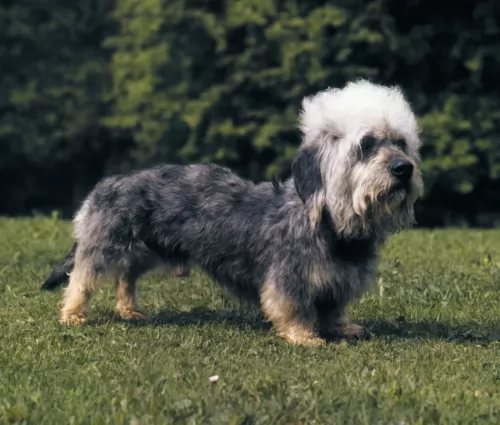 Your Dandie Dinmont is capable of being a wonderful companion. He loves spending time with his human family and is affectionate and loyal.
Your Dandie Dinmont is capable of being a wonderful companion. He loves spending time with his human family and is affectionate and loyal.
The small Dandie is able to fit into life in the city or country, just so long as he has his human family with him. Because he comes from Terrier dogs, he is no push-over though and he has an independent streak which will benefit from training and socialization.
Make sure you give this small dog of yours plenty of love and good care and you will find that you have a loyal, devoted friend in him.
 Kooiker, as he’s fondly referred to for short, has a happy personality, and bringing him into your home will be like bringing in some joy and sunshine.
Kooiker, as he’s fondly referred to for short, has a happy personality, and bringing him into your home will be like bringing in some joy and sunshine.
He is a fun, energetic companion and you can count him in for all your outdoor activities such as walk, hikes and swimming. He’ll love to fetch every ball you throw, and that’s because he is such a playful dog.
He is a loving dog too, making a great playmate for children. Treat him like one of the family, and the Kooiker will surprise you with the amount of pleasure he brings.
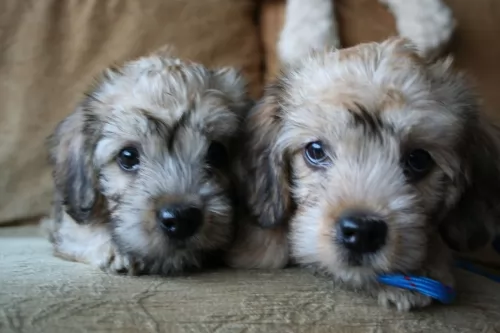 Your pet Dandie Dinmont is a robust little dog who, with good care, can live to be anything between 12 to 15 years of age.
Your pet Dandie Dinmont is a robust little dog who, with good care, can live to be anything between 12 to 15 years of age.
With every dog breed there will be health concerns, and these can include illnesses such as epilepsy as well as hypochondroplasia. All dogs have the potential to fall prey to health problems, and getting your pet from a reputable breeder can help to ensure you eliminate some of these diseases.
This small dog has a long body which means he can be affected by spinal problems. Genetics and body shape play a large role. Intervertebral disc disease is a condition where the cushioning discs between the vertebrae of the spinal column herniate into the spinal cord space. The discs press on the nerves and pain and paralysis can follow.
 The lifespan of the Kooikerhondje is about 12 – 14 years, and looked after well, he can be your canine friend for many years.
The lifespan of the Kooikerhondje is about 12 – 14 years, and looked after well, he can be your canine friend for many years.
He loves his food and can put on weight easily, and obesity is one of the health problems he may have to deal with. Kidney- and eye problems might also be something that you may have to deal with with this dog breed, although most unlikely.
Obesity in dogs is very sad because its a disease that can be avoided. Dogs that are over fed are at particular risk because they can't exercise, and this in itself can lead to serious health issues.
There are different causes of obesity, but it is mostly caused by the dog being fed- and eating more than he can expend. Just like with humans, obesity becomes more common in old age as the metabolism slows down. A dog that has been neutered or spayed also tends to put on weight more easily.
If you're unsure what to do for your obese dog, speak to your vet who can recommend a diet for your pet. Remember that with feeding your dog, prevention is better than cure.
Kidney problems, though more common with older dogs, can strike at any age. The kidneys play a host of important functions such as regulating blood pressure. Sometimes kidney failure is slow and the symptoms may not be obvious.
With renal failure, your pet will be lethargic, they will be vomiting, be depressed and have weight loss. Other possible symptoms are increased thirst, blood in the urine and seizures. Chronic renal failure can't be cured but treatment is aimed at making your pet comfortable.
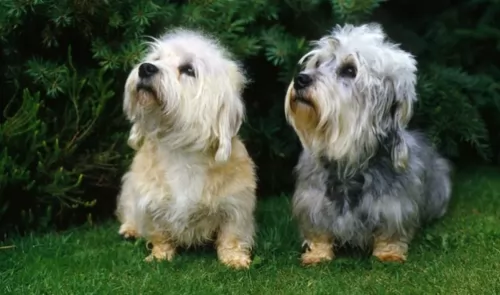 The Dandie doesn’t require as much exercise as some other dog breeds but you want to make sure he goes with you on your walks, or you play ball with him in the garden. You don’t want to see a small dog like this becoming obese as it can herald in a host of health problems.
The Dandie doesn’t require as much exercise as some other dog breeds but you want to make sure he goes with you on your walks, or you play ball with him in the garden. You don’t want to see a small dog like this becoming obese as it can herald in a host of health problems.
The Dandie Dinmont Terrier doesn’t shed a hang of a lot but still, you will need to brush him twice a week to get rid of those loose hairs. Also, the coat will require stripping twice a year. Some dog owners who prefer a low maintenance breed might not like knowing this, but it is a necessary part of his grooming. There are some dog owners who cut the hair rather, but then the texture of the coat will change. This is only important to know if you want to show your Dandie. Other Dandie owners take their pets to a professional groomer for clipping.
Because the Dandie has floppy ears and a lot of hair around the face and ears, you will need to check his ears for dirt and wax build-up as these can cause an ear infection. If you’re nervous to be going inside your dog’s ears, the vet or the dog groomer can show you how.
Also, little dogs like this are prone to tooth decay, and you will need to brush his teeth 2 or 3 times a week. This is because plaque and tartar buildup can cause mouth infections which contribute to other diseases within the body.
 Your Kooikerhondje is smart, happy-go-lucky dog and it is important to know your pet's needs so you can care properly for him. Exercise your Kooikerhondje daily as he is a high-energy dog and even short walks can be good for him.
Your Kooikerhondje is smart, happy-go-lucky dog and it is important to know your pet's needs so you can care properly for him. Exercise your Kooikerhondje daily as he is a high-energy dog and even short walks can be good for him.
He absolutely loves balls games too. He can live in the city or the country but will do better when he has the chance for exercise. Urban- and city environments can work if there are nearby parks to cater for his energy.
The Kooikehondje has long hair but he is surprisingly low maintenance and will simply require a brush once or twice a week.
If you love your pet but just can't find the time to see to his grooming needs, take him to the vet for regular checkups to check ears, teeth and eyes. They can come down with problems with the eyes or have some or other skin allergy.
Give your Kooikerhondje the right food, and make sure its the highest quality. If you buy him commercially manufactured food, pay attention to the ingredients list and make sure that proper meat is at the top of the list.
Add cooked chicken, brown rice and vegetables to his dry kibble as a tasty treat sometimes. Learn to recognize the less nutritious ingredients such as wheat or grain. Also learn to avoid foods which are bad for your dog such as chocolate and onions.